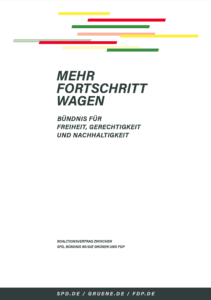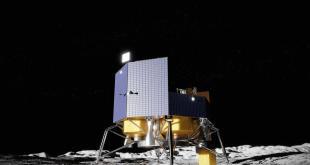by Christoph Beischl, London Institute of Space Policy and Law
The next German Government’s draft Coalition Agreement: Direct references to space
 The three political parties most likely to form the German government for the next four years – Sozialdemokratische Partei Deutschlands (Social Democratic Party of Germany; SPD), Bündnis 90/Die Grünen (Alliance 90/The Greens), Freie Demokratische Partei (Free Democratic Party; FDP) – published their draft Coalition Agreement (https://www.spd.de/fileadmin/Dokumente/Koalitionsvertrag/Koalitionsvertrag_2021-2025.pdf) yesterday, 24 November 2021.
The three political parties most likely to form the German government for the next four years – Sozialdemokratische Partei Deutschlands (Social Democratic Party of Germany; SPD), Bündnis 90/Die Grünen (Alliance 90/The Greens), Freie Demokratische Partei (Free Democratic Party; FDP) – published their draft Coalition Agreement (https://www.spd.de/fileadmin/Dokumente/Koalitionsvertrag/Koalitionsvertrag_2021-2025.pdf) yesterday, 24 November 2021.
The Agreement that will function as a core political document of the German government is expected soon to be approved by the relevant party bodies.
The Agreement addresses space several times. There is no immediate indication that there will be a considerable shift in Germany’s approach.
The following provides rough translations of the direct references to space.
ISPL will update this document as more details about the new German government’s Space Policy and Strategy emerge. In particular, ISPL looks forward to assessing the coalition’s proposed new space strategy – expected to be released some time in 2022.
Direct references to space:
- The subject area Innovation, Science, University and Research has a section on Future Strategy Research.
The section lists as the fifth focal area the exploration of outer space and the high seas, as well as the establishment of sustainable use regimes. - The subject area Economy has a section on Air- and Spaceflight.
The coalition considers spaceflight and the NewSpace area to be focal future technologies.
The coalition will strengthen the national space programme and the European Space Agency (ESA), as well as preserve their independence.
Moreover, it will develop a new space strategy, with due regard to the prevention and removal of space debris. - The subject area Foreign Affairs, Security, Defence, Development, Human Rights has a section on Denuclearisation, Arms Control, Arms Export.
The section states that the coalition seeks the peaceful use of outer space and cyberspace.
Also, it will at an early stage be proactive in arms control against biotech, hypersonic, space, cyber, and AI-linked weapon technology development.

Christoph Beischl is a Research Fellow at the London Institute of Space Policy and Law (ISPL) focusing on space policy and law. His research extends to space programmes in East Asia, the UK and Germany, international space cooperation, space terminology, and space safety and security. He is a member of the International Institute of Space Law (IISL) and a Physics Academic Visitor at Imperial College London. He served as Co-Lead of the Space Law and Policy Project Group of the Space Generation Advisory Council (SGAC) from 2016-2019. He holds a PhD from the Institute of Advanced Legal Studies (IALS), University of London, having examined the potential for establishment of an Asian Space Agency. He is a strong proponent of online privacy.
Reference to the published report: https://www.space-institute.org/wp-content/uploads/2021/11/The-next-German-Governments-draft-Coalition-Agreement-Direct-references-to-space_cb_ISPL_20211125.pdf





